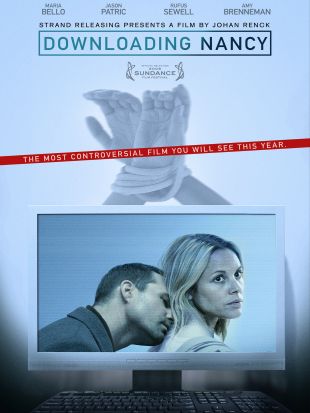Nancy only smiles when she's dreaming about death, and even then the anguish in her eyes is unmistakable. Downloading Nancy is nothing if not confrontational, yet despite our instincts to recoil in disgust from the subject matter, it's the raw emotions in Lee Ross and Pamela Cuming's smartly structured screenplay, and an absolutely fearless performance by Maria Bello, that keep us riveted to the screen as the film's tormented protagonist makes one last desperate attempt at freeing herself from the soul-stifling prison of her own mind.
The first time we hear Nancy speak, she claims that death feels like "sucking pure oxygen," and that life feels like "being trapped in the wrong house and looking for a way out." Immediately thereafter, we see her for the very first time, furtively lighting a cigarette on a bus ride to oblivion. Nancy has just left home, and the only clue to her whereabouts is a note to her husband, Albert (Rufus Sewell), claiming that she is visiting friends in Baltimore. The truth is that Nancy has chosen to embrace death, but she's already dead -- at least on the inside. Sexually abused by her uncle as a young girl, she has come to associate pain with love, and only feels alive when she's slicing her arms and legs with razor blades. To Nancy, death isn't something to fear, but a liberating force to be warmly embraced -- it's the one state of being that is powerful enough to end her agony. A reclusive Internet addict, she has finally found a man who is willing to free her from her body. His name is Louis (Jason Patric), and he's a mysterious loner addicted to violent sex. Meanwhile, as his wife ventures out toward the abyss, uncaring Albert can't even be bothered to file a missing persons police report after three days go by without so much as a telephone call from Nancy. When Louis arrives on his doorstep claiming to be a computer repairman, the truth about Nancy's dark journey finally begins to emerge.
Selling a movie about a sexually abused woman who seeks her own death at the hands of a violent sex addict is no easy task, though Downloading Nancy covers this undeniably disturbing subject matter with exceptional style and commendable restraint. From the hypnotic opening shot of Albert driving through a car wash as Nancy discusses death with her therapist, it's obvious that this isn't going to be a conventional narrative, and it's precisely that approach that makes us want to find out how this deeply unsettling sequence of events will play out. By toying with the timeline of events, Cuming and Ross tell us everything we need to know about Nancy, Albert, and Louis in order to understand precisely how they arrived at this point in their lives. We know what Nancy wants, and we suspect that Louis is capable of giving it to her, though we're never quite certain where the story will take us next. Who is more of a monster anyway -- the husband who neglects the wife who has been silently suffering and self-mutilating right before his eyes for the past 15 years, or the taciturn deviant who actually takes the time to try and understand that suffering, despite his intentions to eventually kill her? Downloading Nancy doesn't offer any concrete answers to this troubling question, though by turning the mirror back on Albert before we even know Nancy's ultimate fate, it forces us to consider the profound pain caused by neglect, be it passive or intentional. Watching Nancy lay her soul bare to Louis, we're faced with the sad reality that, with a little understanding, perhaps she may have been able to overcome her tragic past.
As Nancy, Bello personifies pain; she embraces her long-suffering character's deep-rooted distress with open arms, delivering the kind of performance that will linger with the viewer for days to follow. Nancy's gaze isn't wounded, it's absolutely destroyed, and Bello's eyes convey that emotional devastation with transcendent conviction. It may well be the defining performance of her entire career, and her quiet intensity is only strengthened by her pairing with the underappreciated Patric, whose emotionally complex portrayal of the enigmatic Louis prevents the audience from ever coloring his character as the hero or the villain of the story. And despite the fact that Sewell awkwardly fumbles his accent in one pivotal scene, his performance as the emotional black hole at the center of this grim tale is absolutely chilling. A dedicated golf fanatic, Albert has channeled all of his energy into creating a revolutionary computerized swing analyzer in his den -- a faux-wood shrine to suburban mediocrity -- but at what price?
It's unusual that a film set primarily in an unadorned suburban home, a psychiatrist's office, and various cheap hotel rooms could have any real visual or stylistic impact, but when those locales are being shot by famed cinematographer Christopher Doyle, they create a kind of magnificent insipidness that projects Nancy's inner emptiness on the screen for all to see. Combined with first-time feature filmmaker Johan Renck's stark direction and Krister Linder's warped, seductively dissonant score, Doyle's striking visuals create a world that seems to be haunted by the living, rather than the dead. And while not every movie lover will be eager to pay the emotional toll required to visit this cold, lonely place, those compelled to take the journey are rewarded with a complex meditation on the devastating role that abuse and neglect can play in hastening the downward spiral of the desperate and damaged.
